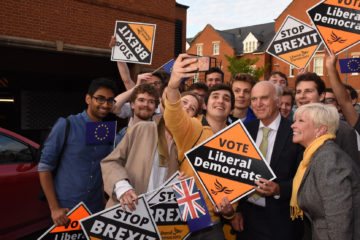Recently, I tried to explain to an elderly relative why I didn’t have any hope in British politics.
It was, I explained, the cumulative effect of the past decade or so: the collapse of the political centre since 2008; a foolish and self-destructive Brexit, the rise of a preening radical apparently oblivious to antisemitism in his own party on the one hand, and an amoral charlatan intent on obliterating the last traces of probity and integrity in public office on the other; a devastating pandemic, the bizarre fever dream of Liz something-or-other, and now the reign of a tech bro whose sole success – aside from hoping that inflation will fall – has been to revolutionise the Rwandan government’s balance sheet. And that was just in the UK.
What is there left to hope for? While we’ve been busy with this cocktail of the trivial and the insane, our public services crumble, climate change gathers pace like a runaway train, and reactionary authoritarianism blossoms across the world.
Perhaps it’s hard to explain to someone older the worldview that growing up during these events specifically gives you. If every generation believes they’re coming of age in a chaos not of their own making (they didn’t start the fire), how are we special?
It might, of course, be the scale of the threat we face in the climate crisis: the constant attitude of helpless lethargy among our governments, combined with the guilt attached to every single act of consumption, is certainly wearing. My view, though, is that it’s the relentlessness: the unending blizzard of crisis, of failure, of malice, and of self-destructive incompetence that has characterised our generation’s journey to political maturity. I haven’t once believed, as a wise pop-group once sang, that things can only get better.
For me, though, part of growing up has also been realising that we nonetheless have a role to play in fighting to make things better. We are not just bystanders to this political dysfunction: all the levels of democracy to which we have access give us levers, however imperfect they may be, to shape politics in the way we choose.
There are students’ union elections in Lent, local elections in May, a General Election this year. In every one of those, you can stand as a candidate, you can campaign, deliver leaflets, canvass voters; you can, in short, make a difference. Elections give us a unique opportunity to redefine the parameters of politics, by changing who wields power for the next one, or two, or five years. Imagine a parliament not stacked with craven inadequacies, a local government intent on building homes and protecting trans rights, an SU not led by Fergu… never mind.
If you’re anything like me, you feel that politics has utterly failed you. The binary choice of malicious, reactionary conservatism, and ineffectual, idealistic radicalism that has done so much to shape the past decade of British politics has led us to this dead end.
It strikes me, though, that we’re also at risk of failing politics, if we sit back and let the chaos run its course. It’s all very well to post Instagram stories when something really rattles us, but to slip back into inertia once injustice is no longer placed under our noses is to sell ourselves short.
If you care, and you want something to be different, then do something. Run for a student election, join a political party – any party – and, for god’s sake, campaign. Don’t sit there and ask into the void, ‘why is it like this?’, or, as I used to, ‘why is there no hope?’. Nobody’s going to give us hope: it’s on us to get out there and build it for ourselves.
Fergus is the Vice-Chair of CULA, a member of the Young Liberals national executive committee, and the Undergrad President of Cambridge SU. This blog is written purely in a personal capacity, and does not reflect the views of these or any other organisations or individuals.



0 Comments